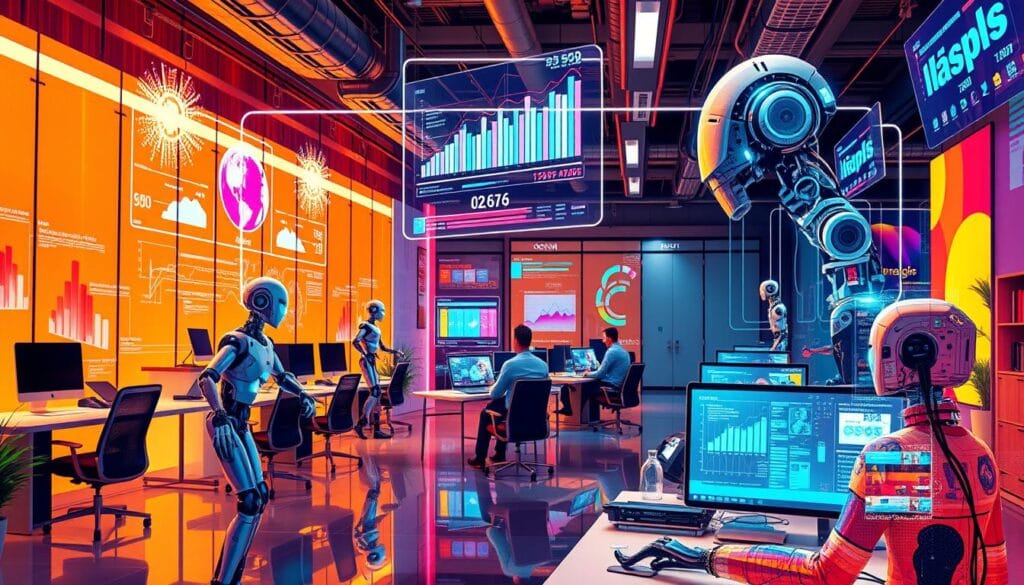What Is Artificial Intelligence AI?

Artificial Intelligence AI has become a ubiquitous term in today’s technological landscape, shaping the way we interact with machines and data. This article delves into the realm of AI, exploring its definition, historical roots, diverse applications, underlying technologies like machine learning and deep learning, as well as the ethical considerations, challenges, and future prospects associated with this rapidly evolving field. Join us on a journey to unravel the mysteries and potentials of Artificial Intelligence.
Introduction to Artificial Intelligence AI
Artificial Intelligence, or AI for short, is like that cool kid at the science fair who can outsmart everyone in a game of chess or recommend movies you didn’t even know you wanted to watch. It’s all about machines mimicking human-like intelligence to perform tasks, learn from experiences, and adapt to new situations. In simpler terms, AI is like giving your computer a brain upgrade, so it can do some pretty mind-blowing stuff!
Defining Artificial Intelligence
Artificial Intelligence AI is the secret sauce behind self-driving cars, virtual assistants like Siri or Alexa, and those annoyingly good predictive text suggestions on your phone. It’s essentially teaching machines to think, learn, and make decisions just like us humans, minus the need for coffee breaks or Instagram distractions.
Importance of AI in Today’s World
In a world where data is king and technology is moving at warp speed, AI is the superhero we need to tackle complex problems, streamline processes, and make our lives easier. From revolutionizing healthcare with personalized treatment plans to powering smart homes that anticipate our every need, AI is everywhere, quietly working its magic behind the scenes.

History and Evolution of AI
Ever wondered how AI went from sci-fi fantasy to everyday reality? Let’s take a trip down memory lane to uncover the fascinating origins and major breakthroughs that shaped the AI landscape as we know it today.
Early Beginnings of AI
AI may be all the rage now, but its roots go way back to the 1950s when a bunch of brainiacs first started dreaming up machines that could think like humans. These early pioneers laid the groundwork for AI, setting the stage for a revolution that would change the world as we know it.
Milestones in AI Development
Fast forward a few decades, and AI has come a long way since its humble beginnings. From IBM’s Deep Blue beating a chess grandmaster to Google’s AlphaGo mastering the ancient game of Go, there have been some major “aha” moments that pushed the boundaries of what AI can achieve. With each milestone, AI gets smarter, faster, and a little bit closer to taking over the world (just kidding… or am I?).

Types and Applications of AI
So, what flavors of AI are out there, and how are they making our lives more awesome? Let’s dive into the different types of AI and explore some real-world applications that are changing the game in industries like healthcare, finance, and beyond.
Types of Artificial Intelligence AI
AI isn’t a one-size-fits-all deal. There are different flavors of AI, each with its own superpowers and quirks. Whether it’s the rule-based logic of Narrow AI or the all-knowing intuition of General AI, there’s a type of AI for every situation, like a superhero for every job (minus the cape and spandex).
Real-World Applications of AI
From predicting stock market trends to diagnosing diseases with pinpoint accuracy, AI is like a Swiss Army knife of awesomeness when it comes to real-world applications. It’s the secret sauce behind Netflix recommendations, facial recognition tech, and even those pesky chatbots that keep popping up when you least expect them. AI is everywhere, quietly making our lives better, one algorithm at a time.
How AI Works: Machine Learning and Deep Learning
Alright, so how does AI actually pull off its magic tricks? Enter Machine Learning and Deep Learning, the dynamic duo that powers everything from self-driving cars to voice recognition software. Let’s unravel the mysteries of these cutting-edge technologies and see how they’re shaping the future of AI.

Understanding Machine Learning
Machine Learning is like teaching your computer to learn from data, spot patterns, and make decisions without being explicitly programmed. It’s the engine that drives AI forward, helping machines get smarter over time and adapt to new challenges like a seasoned pro.
Exploring Deep Learning Algorithms
Deep Learning takes Machine Learning to the next level by mimicking the way our brains process information through artificial neural networks. Think of it as giving your computer a crash course in neural science, so it can tackle complex tasks like image recognition, natural language processing, and more with human-like precision. Deep Learning is like the brainiac of the AI world, constantly pushing the boundaries of what machines can do.**Ethical Considerations in Artificial Intelligence**
As AI technology advances, ethical considerations become increasingly important.
**Privacy and Data Security Concerns**
With AI systems collecting and analyzing vast amounts of data, privacy and data security concerns are at the forefront. How can we ensure our personal information is protected in this digital age?
**Biases and Fairness in AI Systems**
AI algorithms are only as unbiased as the data they are trained on. Ensuring fairness in AI systems is crucial to prevent discrimination and promote inclusivity.
**Challenges and Limitations of AI**
Despite its potential, AI faces several challenges and limitations that need to be addressed.
**Technical Challenges in AI Development**
From algorithm complexity to hardware limitations, technical challenges in AI development must be overcome to make further progress in the field.
**Social and Economic Implications of AI**
The integration of AI into society raises questions about its impact on jobs, inequality, and the economy. How can we harness AI’s potential while mitigating its negative consequences?
**The Future of Artificial Intelligence AI**
What does the future hold for AI, and how will it shape our world in the years to come?
**Emerging Trends in AI Research**
From reinforcement learning to neural networks, AI research is constantly evolving. Staying up-to-date with emerging trends is crucial for understanding the future trajectory of AI.
**Potential Impact of AI on Society**
As AI becomes more integrated into our daily lives, its impact on society will only grow. How can we harness the benefits of AI while addressing its potential challenges?In conclusion, Artificial Intelligence AI continues to revolutionize industries, societies, and the way we perceive intelligence itself. As we navigate the complexities and opportunities presented by AI, it is crucial to address ethical concerns, mitigate challenges, and harness its potential for the betterment of humanity. The future holds endless possibilities as AI continues to push the boundaries of innovation and reshape the world as we know it.
Frequently Asked Questions about Artificial Intelligence
What is the difference between Artificial Intelligence AI and Machine Learning?
Artificial Intelligence AI is a broad field of computer science focused on creating systems that can perform tasks that typically require human intelligence. This includes reasoning, problem-solving, understanding natural language, and perception. Machine Learning (ML) is a subset of AI that specifically deals with the development of algorithms that allow computers to learn from and make predictions based on data. In essence, while all machine learning is AI, not all AI is machine learning. AI encompasses a wider range of technologies, including rule-based systems, expert systems, and robotics, whereas machine learning focuses on data-driven learning and pattern recognition.
How is AI being used in various industries today?
AI is being utilized across numerous industries in various ways:
- Healthcare: AI algorithms assist in diagnosing diseases, personalizing treatment plans, and predicting patient outcomes. For example, AI can analyze medical images to detect conditions like cancer.
- Finance: AI is used for fraud detection, algorithmic trading, and risk assessment. Machine learning models analyze transaction patterns to identify anomalies.
- Retail: AI enhances customer experiences through personalized recommendations, inventory management, and chatbots for customer service.
- Manufacturing: AI optimizes supply chain management, predictive maintenance, and quality control through data analysis and automation.
- Transportation: AI powers autonomous vehicles, optimizes routing for logistics, and enhances traffic management systems.
- Entertainment: AI is used in content recommendation systems, video game development, and even in creating music and art.
What are the key ethical considerations surrounding the use of Artificial Intelligence AI?
Key ethical considerations in AI include:
- Bias and Fairness: AI systems can perpetuate or amplify biases present in training data, leading to unfair treatment of individuals based on race, gender, or socioeconomic status.
- Privacy: The use of Artificial Intelligence AI often involves the collection and analysis of large amounts of personal data, raising concerns about user privacy and data security.
- Accountability: Determining who is responsible for decisions made by Artificial Intelligence AI systems, especially in critical areas like healthcare and criminal justice, is a significant ethical challenge.
- Transparency: Many AI systems operate as “black boxes,” making it difficult to understand how decisions are made. This lack of transparency can erode trust and hinder accountability.
- Job Displacement: The automation of tasks through AI can lead to job losses in certain sectors, raising concerns about the future of work and economic inequality.
What are some common challenges faced in the development and implementation of AI technologies?
Common challenges in Artificial Intelligence AI development and implementation include:
- Data Quality and Availability: AI systems require large amounts of high-quality data for training. Poor data quality or insufficient data can lead to ineffective models.
- Integration with Existing Systems: Incorporating AI technologies into legacy systems can be complex and costly, requiring significant changes to infrastructure.
- Skill Shortages: There is a high demand for skilled professionals in AI and machine learning, leading to a talent shortage in the industry.
- Regulatory Compliance: Navigating the regulatory landscape surrounding data privacy, security, and ethical use of Artificial Intelligence AI can be challenging for organizations.
- Public Perception and Trust: Building trust in AI systems is crucial, as public skepticism can hinder adoption. Addressing concerns about bias, privacy, and accountability is essential for gaining user acceptance.






